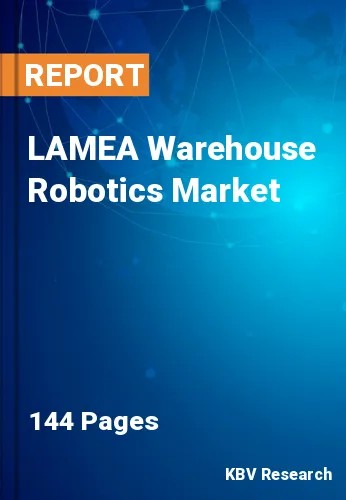The Latin America, Middle East and Africa Warehouse Robotics Market would witness market growth of 22.7% CAGR during the forecast period (2023-2029).
The warehousing business has already been affected by the Internet of Things (IoT), machine learning (ML), artificial intelligence (AI), and other related technologies. It is predicted that in the near future, this industry will continue to be affected by these technologies, which will further propel the market's growth. To track employee activity, inventory movement, and warehouse operations, there has been a growth in demand for specialized software solutions during the past ten years. Because of this, software experts are always trying to add new features to software solutions.
Robotics deployment has grown drastically as a result of the advent of Industry 4.0 and the rise in warehouse digitization across industries. The robots now have greater functionality, efficiency, and accuracy. Robotic sensor advances in technology are also helping the employment of robots in a variety of end-use sectors. The robots can operate with more precision and accuracy owing to these sensors.
The electrical, automotive, and metal industries in the United Arab Emirates are just a few examples of how robotics and automation have improved industrial processes. Many prestigious industrial businesses utilize industrial robots to meet all trade requirements. The significant concentration of well-known firms in the nation has an impact on the widespread use of industrial robots. Due to increased robotics investments, especially in healthcare, learning, and sports, Qatar has experienced an increase in the need for industrial robots similar to other nations. Because of the region's continuing population increase and accelerating industrialization, it is anticipated that the regional market will rise over the coming years.
The Brazil market dominated the LAMEA Warehouse Robotics Market by Country in 2022, and would continue to be a dominant market till 2029; thereby, achieving a market value of $264 million by 2029. The Argentina market is exhibiting a CAGR of 23.4% during (2023 - 2029). Additionally, The UAE market would showcase a CAGR of 22.4% during (2023 - 2029).
Based on Function, the market is segmented into Pick & Place, Palletizing & De-palletizing, Packaging, and Transportation. Based on Application, the market is segmented into E-commerce, Automotive, Consumer Electronics, Healthcare, Food & Beverage and Others. Based on Product, the market is segmented into Mobile Robots, Articulated Robots, Cylindrical Robots, Scara & Parallel Robots and Cartesian Robots. Based on Payload Capacity, the market is segmented into Below 10 kg, 11 kg to 80 kg, 81 kg to 400 kg and 400 kg & Above. Based on Component, the market is segmented into Hardware, Software and Services. Based on countries, the market is segmented into Brazil, Argentina, UAE, Saudi Arabia, South Africa, Nigeria, and Rest of LAMEA.
Free Valuable Insights: The Worldwide Warehouse Robotics Market is Projected to reach USD 13.9 Billion by 2029, at a CAGR of 19%
The market research report covers the analysis of key stake holders of the market. Key companies profiled in the report include ABB Ltd, Bastian Solutions, LLC (Toyota Advanced Logistics Group) (Toyota Industries Corporation), Daifuku Co., Limited, Dematic Group (Kion Group AG), Fetch Robotics, Inc. (Zebra Technologies Corporation), Honeywell International, Inc., Knapp AG, Kuka AG (Swisslog Holding AG), Omron Corporation and Yaskawa Electric Corporation.
By Function
By Application
By Product
By Payload Capacity
By Component
By Country
Our team of dedicated experts can provide you with attractive expansion opportunities for your business.

